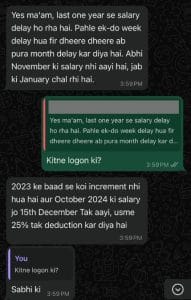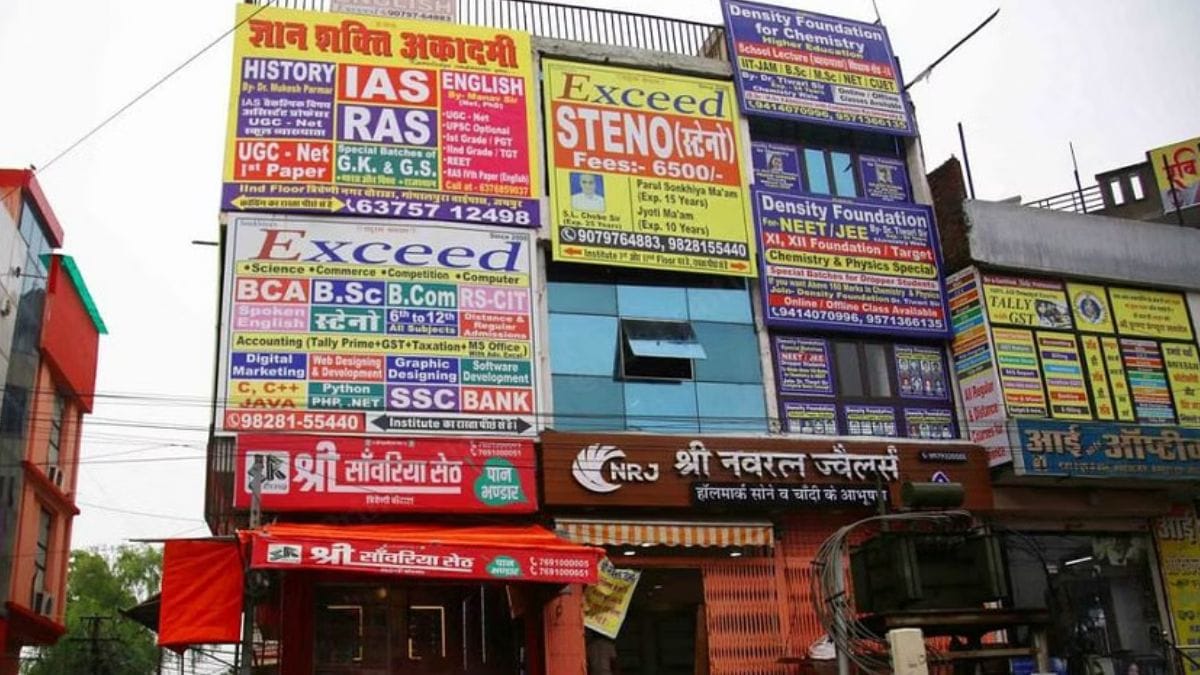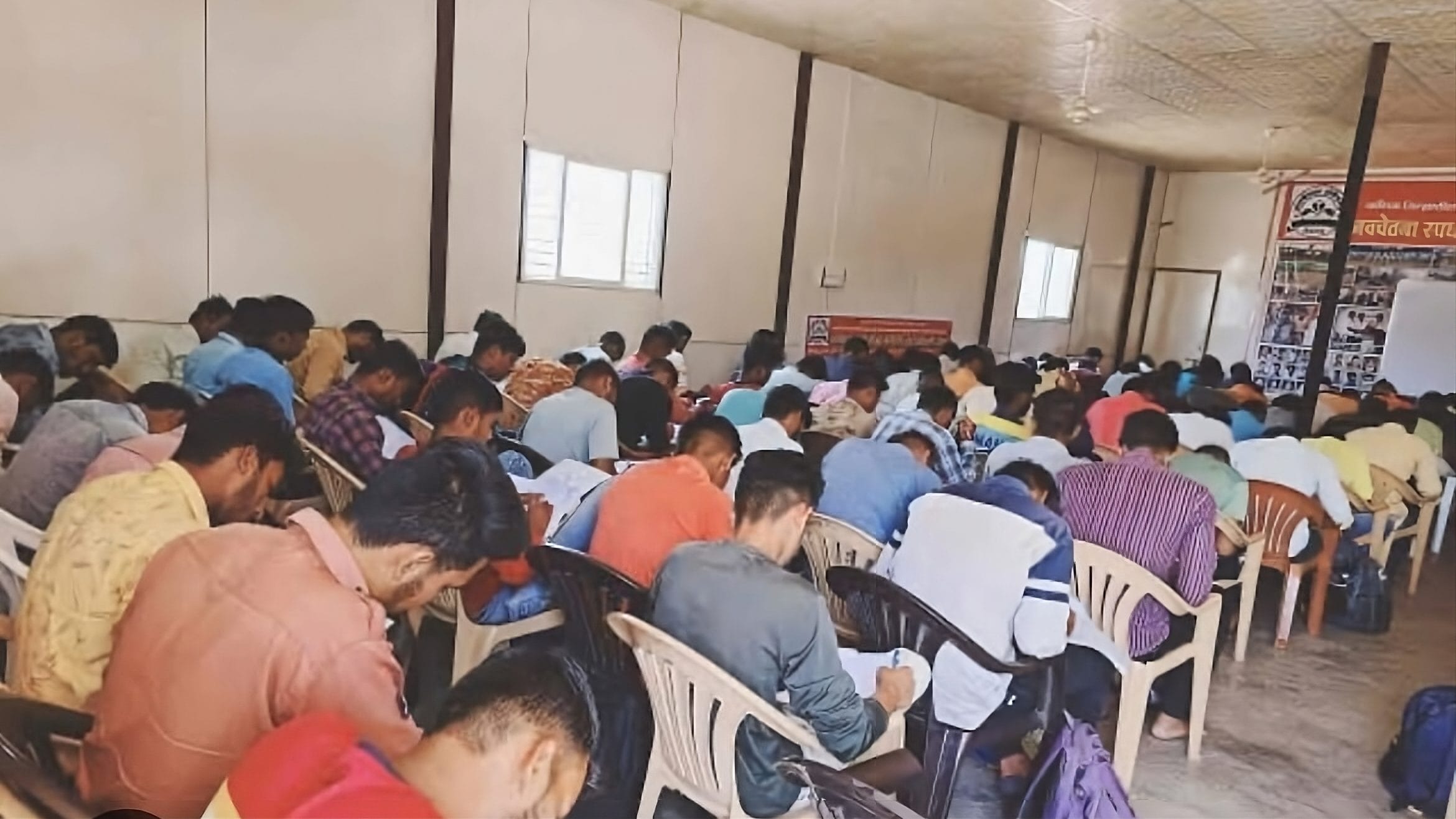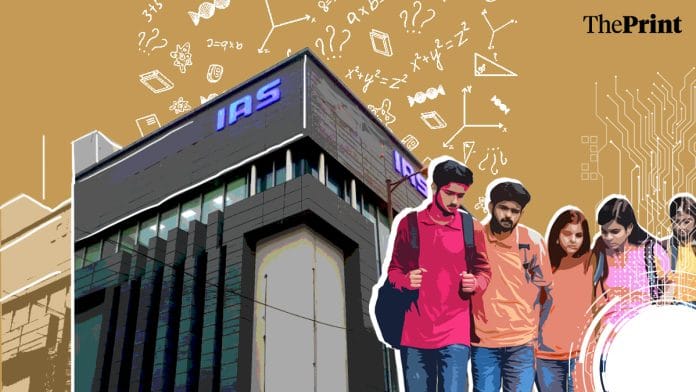New Delhi: The warning bells began to sound last year. First, salaries were delayed by a few days. Then came the pay cuts. And now, a 30-year-old team leader from Noida is still waiting for his November salary. He doesn’t work in the beleaguered tech sector but in a well-known UPSC coaching institute with centres in Karol Bagh and Mukherjee Nagar.
“We’ve been experiencing delays in salary payments. On top of that, people are facing a 20 to 25 per cent salary deduction as well,” said the executive, checking his phone for the familiar notification of his salary being credited. He received his October salary on 7 December but is still waiting for his November and December dues.
Delhi’s coaching hubs of Karol Bagh, Mukherjee Nagar, and Rajendra Nagar have not recovered from the deaths of three UPSC aspirants who drowned in the basement library of their coaching institute in July 2024. Crackdowns by the authorities, concerns about overcrowded classrooms, lack of infrastructure, high fees, and even quality of tutors are seeing parents and aspirants rethink enrolment in brick-and-mortar coaching institutes that were once the mainstay of the Rs 3,000-crore coaching industry.

The turbulence isn’t confined to UPSC coaching institutes. A top tutoring centre for engineering aspirants, FIITJEE, has now closed at least eight centres in North India after the mass resignation of hundreds of its teachers over non-payment of salaries and pay cuts. Centres in cities such as Meerut, Ghaziabad, Lucknow, and Varanasi in Uttar Pradesh, along with one centre each in Bhopal (Madhya Pradesh), Patna (Bihar), and Laxmi Nagar (Delhi), have shut down, leaving students and parents at a loss.
Parents have reached out to local police, demanding refunds and accountability from FIITJEE. While the police have assured them that their grievances will be addressed, the situation remains tense.
“This issue has been ongoing for one year. In the previous year, we received our salaries only 4-5 times, that too with pay cuts. We are exploring our legal actions as of now. A few teachers have moved to different coaching institutes for survival,” said a teacher who used to teach in FIITJEE’s Gurgaon centre.
Top UPSC coaching institutes admitted that they are experiencing a decline in admissions.
“The industry is currently grappling with a significant slowdown. Informal discussions within the sector indicate that nearly all institutions have experienced a 40 to 50 per cent decline in admissions during this financial year,” said Vivek Tiwari, chief executive officer of Drishti IAS.
Even if the institute is seeing losses, there should be proper communication with employees. The founder never spoke to us about these measurements and people are scared to ask as they can fire the person.
Noida-based coaching centre employee
The institute relocated to Noida in August 2024, after the Municipal Corporation of Delhi (MCD) sealed its centre for running classes in a basement.
“Our primary focus has been to ensure that employees’ salaries are paid in full, without any cuts or delays,” Tiwari added.
Drishti IAS, with its seven centres across India, can weather the tide. But others, like the institute the Noida team leader works for, have rolled out cost-cutting measures. These range from reducing salaries and freezing recruitment to changing incentive packages.
“The UPSC coaching industry, as a whole, in the year 2024, has and is continuing to face unprecedented challenges,” the coaching institute told ThePrint via email. “Of late, there has been a temporary delay of a few weeks in disbursement of salaries owing to a reduction in business operations, which is expected to normalise soon.”
No communication
In the eight years since he joined the coaching institute, the Noida executive has risen the ranks to become a team lead with a salary of a little over one lakh rupees a month. There were regular increments, incentives, and promotions. Now, he relies on his friends to help him until his next paycheck. Every month without a salary brings new tensions.
“The landlord doesn’t care if I have received my salary or not. The monthly expenses are the same,” he said, scrolling through text messages to his friends asking for financial help. His colleagues are in a similar situation.
“We’ve been dealing with these delays for almost a year, and there has been no prior communication about it. The management only sent an email to us after the deductions and delays. We feel exploited, and it’s extremely frustrating,” said another employee from the same institute.

Initially, salaries were delayed by a week. A week soon turned into a fortnight, and now there are months-long stretches without pay.
“The UPSC coaching industry and other education institutes in the sector are facing unprecedented challenges due to numerous unexpected external variables in 2024. We kindly request your understanding as we implement temporary measures, including cost-cutting initiatives and revisions to salaries and professional fees, until the educational industry normalizes,” read the email sent to a selective group of employees by the institute.
And while there has been a dip in enrollment for ‘offline’ classes, the employees pointed out that other verticals are thriving.
“There are test series, mentoring and crash courses, answer writing programs, and interview guidance programs that earn money for the institute. These are doing well” said the Noida team lead. He and his colleagues are worried about the lack of information from their employer.
“Even if the institute is seeing losses, there should be proper communication with employees. The founder never spoke to us about these measurements and people are scared to ask as they can fire the person,” he added.
The coaching industry is unorganised, with no uniformity in salaries and the mushrooming of fly-by-night ‘institutes’. In the last few years, the Central Consumer Protection Authority has been issuing notices to multiple institutes for misadvertising and making false claims.
After the deaths of aspirants in the basement library, the Delhi authorities have become more strict about permitting centres to run classrooms and even libraries. But no guidelines have been put in place for coaching institutes to formalise fees, study hours, the employment of teachers, and their salaries.
UPSC preparation is emotionally and mentally draining and in places like Delhi, people don’t care about you or your condition. I remember how my landlord even texted me for rent when I was admitted to the hospital. He never asked me about my health.
Jwala Deshpande, IAS aspirant
More often than not, coaching centres and institutes are run by one person, who decides the fees and salaries of teaching and non-teaching staff. Some institutes like Physics Wallah and Adda 24 have adopted a more corporate format, with decisions being made by a board—but they are not the norm.
“In setups where all decisions are centralised under one person, such issues are bound to arise,” said a board member of a prominent coaching institute who did not want to be named.
Also read: Haryana cremations are going green. A Sirsa farmer lit the spark
On the move
Twenty-six-year-old Jwala Deshpande came to Delhi from Pune in 2023 with dreams of becoming an IAS officer. But after the deaths of the three students, she decided to move back home.
Now, she has joined a library in Pune and attends a coaching class near her home.
“My parents got really worried about me after that incident. It is not just the institutes, but the living conditions as well. They’re not good in Karol Bagh or Mukherjee Nagar,” said Deshpande.
Every year, parents take loans and sell ancestral property and gold to fund the IAS dreams of their children. Moving to Delhi can set families back by lakhs of rupees, and most have to rinse and repeat the process for years.
An increasing number of UPSC aspirants, especially those from small towns, are opting for online courses, and joining local libraries and study groups.
“UPSC preparation is emotionally and mentally draining and in places like Delhi, people don’t care about you or your condition. I remember how my landlord even texted me for rent when I was admitted to the hospital. He never asked me about my health,” said Deshpande, who is now saving as much as Rs 18,000 a month.
In this climate of uncertainty, coaching institutes looking to expand and establish their presence in Delhi are having second thoughts. Raj Malhotra’s IAS, a well-established institute in Chandigarh catering to students from Punjab, Haryana, and Himachal Pradesh, opened a branch in Karol Bagh, in March 2024. But within eight months, it shut down its Delhi outpost and consolidated operations back in Chandigarh.
“The deaths of the three UPSC students had a significant impact on many institutes, including mine. With protests affecting our centre in Karol Bagh, and considering our stronger presence and performance in Chandigarh, we decided to focus our efforts here,” said Raj Malhotra, owner of the institute, which has approximately 1,000 students enrolled.
The cost of preparing for UPSC has steadily risen over the past five years. In 2019 the fees for foundation batches were about Rs 1.2 lakh per annum. Today, they stand at Rs 2 lakh per annum, excluding additional expenses for rent, food, and stationery.
“Fees have surged by approximately 40 per cent, driven by rising rent, inflation, and higher salaries for teachers. Ultimately, it’s the students who bear these increased costs,” said Malhotra.
And most, like Desphande, are questioning whether it’s worth the investment when they have access to the same information online.

An increasing number of UPSC aspirants, especially those from small towns, are opting for online courses, and joining local libraries and study groups.
“Students go to coaching institutes for test series and mentorship but not for the foundation course that brings the most money,” said a teacher working for a coaching institute in Delhi who did not want to be named.
“Students opting for online resources have made an impact on offline coaching institutes, but it is too soon to say anything. We have to wait at least a year. The infrastructure in places like Delhi and fast life is one of the reasons students are thinking of not coming to Delhi,” said the owner of the Delhi-based coaching institute.
Also read: No one assaulted Unnao girls—Accused headmaster is back, case closed, parents silent
Course correction
This upheaval has upended the lives of aspirants who’ve taken up part-time jobs with coaching institutes to fund their IAS dream.
Kamlesh Kumar (29), who works as a content writer for a coaching institute in Karol Bagh on a freelance basis, hasn’t been paid for two months. The work earns him about Rs 55,000 a month.
“The money I make here, I cannot make anywhere else. But the timing of the payments is an issue. This industry is not regularised like other sectors such as IT,” said Kumar, who has taken up freelance and contract jobs with four coaching institutes.
“At one institute, I did not get paid for two projects,” he added.
IAS aspirants like Kumar who understand every aspect of the UPSC coaching industry evaluate work, write and translate content, manage libraries, and mentor new aspirants. But work is drying up and payments are becoming irregular.
“I receive payment after every two months, which is a problem as I have to pay rent every month. It’s been six months since I have joined NEXT IAS, but they don’t pay me every month,” said a young man who works as a freelancer. The institute claims that this is in accordance with its policy for freelancers.
“We haven’t cut any salary or delayed it. Some freelancers are paid every month. Others, who evaluate tests and write content, are paid after two months,” said B Singh, CEO and founder of NEXT IAS.
According to Singh, the industry is not in a slump—only on natural course correction.
“After Covid, the UPSC industry saw a rise in admissions but the situation is normalising now. Enrolments are returning to pre-pandemic levels,” said Singh, quickly adding that NEXT IAS has not seen a drop in admissions.
To cater to the post-Covid boom, many institutes invested in more centres, classrooms, and faculty.
“They hired people with high salaries. They formed content teams. Now, they can’t sustain it,” said the owner of the Delhi-based institute.
(Edited by Prasanna Bachchhav)







Excellent news indeed.
Only those should qualify in entrance exams who are genuinely good students – intelligent, disciplined and hardworking.
Rote learners and crammers who are trained at these coaching centers do not deserve to crack any exam at all. All they do is solve the papers for the last 50 years or so and learn shortcuts to get an answer – and they are able to crack the exam.
This results in very poor quality students getting selected at elite institutes.